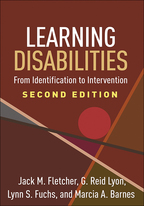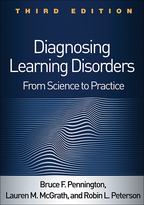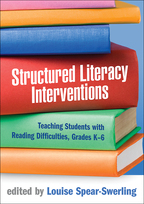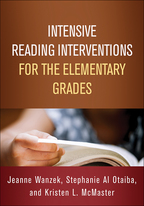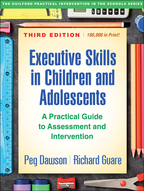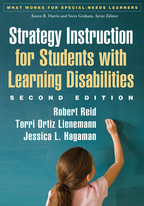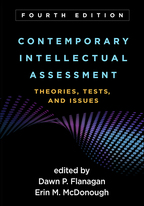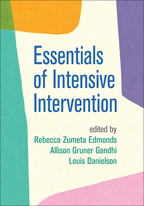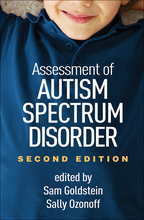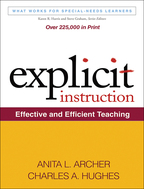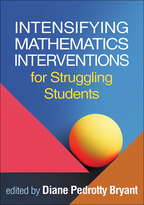Learning Disabilities
Second Edition
From Identification to Intervention
Jack M. Fletcher, G. Reid Lyon, Lynn S. Fuchs, and Marcia A. Barnes
Hardcovere-bookprint + e-book
Hardcover
orderNovember 21, 2018
ISBN 9781462536375
Price: $64.00 418 Pages
Size: 7" x 10"
“Jack Fletcher and his colleagues have written an impressively comprehensive textbook on [learning disabilities] (LD), consisting of strong opinions and conclusions along with a careful review of research to back them up. The authors are all senior scholars in the LD field, and their ability to synthesize findings from a vast literature is remarkable. (Though this is a second edition of a book initially published in 2007, it is such a major expansion and revision that it is essentially a different book.)…This is a textbook more than a practitioner's manual, but practitioners would nonetheless benefit from this accessible review of research and careful arguments for evidence-based practice in LD.”

—NASP Communiqué
“Highly recommended. Upper-division undergraduates through practitioners.”

—Choice Reviews (on the first edition)
“This important work is elegantly crafted by authors who have made significant contributions to research and practice and who are committed to evidence-based solutions to the many challenges associated with diagnosis, assessment, and treatment of LDs. The updated second edition deals with the new discoveries at the intersection of education, psychology, and neuroscience that have been made at a staggering pace, as well as lively debates regarding definitions and criteria setting. Not only is this book timely and authoritative, but it also makes a real contribution to helping us understand where the field is now and where we need to go next. I consider this to be a 'must read' volume for researchers, educators, policymakers, and all others concerned with improving outcomes for children who struggle in the classroom and beyond.”

—Kenneth R. Pugh, PhD, President and Director of Research, Haskins Laboratories; Department of Psychology, University of Connecticut; Department of Linguistics, Yale University
“There are so many books and so little time—yet this one, I assure you, is worth your precious time. Whether your primary interest is teacher training, research, or classroom practice, this book provides the knowledge you need. Building on the exemplary first edition, the second edition features current research on all domains of LDs (math, word reading, writing, reading comprehension) and expanded practical guidance for implementing research-based practices across the grade span. It explains best practices in instruction and assessment in the context of current special and general education policy.”

—Sharon Vaughn, PhD, Executive Director, Meadows Center for Preventing Educational Risk, and Manuel J. Justiz Endowed Chair in Education, The University of Texas at Austin
“Scientific knowledge of LDs has greatly expanded in the dozen years since the first edition was published. The second edition includes a wealth of current information on the types and manifestations of LDs, neurobiological underpinnings, and effective interventions. The coverage is comprehensive; findings are evaluated in terms of the adequacy of their methods and distilled into meaningful summaries of key facets and instructional principles. The many tables and figures underscore important themes and enhance the book’s utility as a professional resource and core text. Beyond its value in updating scientific progress in the field, this work demonstrates both the promise and challenges of broader-scale applications of evidence-based approaches.”

—H. Gerry Taylor, PhD, ABPP-CN, Center for Biobehavioral Health, Nationwide Children’s Hospital Research Institute; Department of Pediatrics, The Ohio State University
“I have been recommending the first edition of this book to every graduate student I work with, and I look forward to continuing this tradition with the second edition. I especially appreciate the new chapter on the reality of LDs and the updated coverage of interventions. Amid ongoing debates about definitions of LDs, the research literature has at times seemed out of step with the reality we see daily of individuals whose performance improves substantially when provided suitable intervention and accommodations. This second edition provides an authoritative source for appropriate interventions.”

—Richard K. Wagner, PhD, Robert O. Lawton Distinguished Professor of Psychology, Florida State University; Associate Director, Florida Center for Reading Research
“The LD field has never been more conceptually chaotic than it is today—fortunately, the second edition of this seminal book provides much-needed clarity. The authors present models for the identification, prevention, and treatment of LDs that are practical and well grounded in research. In addition to pointing out effective approaches based on solid science, the authors also identify common practices that lack support. This book is well suited for preservice trainees and for practitioners who hope to further develop their skills. The second edition addresses the role of MTSS and provides additional information about dyslexia, both of which are important topics in practice today. It should be widely read and used to improve the lives of children with LDs.”

—Matthew K. Burns, PhD, Rose and Irving Fein Endowed Professor of Special Education, University of Florida; Assistant Director, University of Florida Literacy Institute
“This second edition is the definitive source for teachers, administrators, and researchers on evidence-based practices for teaching academic skills to students with LDs. Its acclaimed authors provide a detailed, compelling, and nuanced picture of LDs and how to address their impact on students’ learning.”

—Steve Graham, EdD, Warner Professor, Mary Lou Fulton Teachers College, Arizona State University
—NASP Communiqué
“Highly recommended. Upper-division undergraduates through practitioners.”
—Choice Reviews (on the first edition)
“This important work is elegantly crafted by authors who have made significant contributions to research and practice and who are committed to evidence-based solutions to the many challenges associated with diagnosis, assessment, and treatment of LDs. The updated second edition deals with the new discoveries at the intersection of education, psychology, and neuroscience that have been made at a staggering pace, as well as lively debates regarding definitions and criteria setting. Not only is this book timely and authoritative, but it also makes a real contribution to helping us understand where the field is now and where we need to go next. I consider this to be a 'must read' volume for researchers, educators, policymakers, and all others concerned with improving outcomes for children who struggle in the classroom and beyond.”
—Kenneth R. Pugh, PhD, President and Director of Research, Haskins Laboratories; Department of Psychology, University of Connecticut; Department of Linguistics, Yale University
“There are so many books and so little time—yet this one, I assure you, is worth your precious time. Whether your primary interest is teacher training, research, or classroom practice, this book provides the knowledge you need. Building on the exemplary first edition, the second edition features current research on all domains of LDs (math, word reading, writing, reading comprehension) and expanded practical guidance for implementing research-based practices across the grade span. It explains best practices in instruction and assessment in the context of current special and general education policy.”
—Sharon Vaughn, PhD, Executive Director, Meadows Center for Preventing Educational Risk, and Manuel J. Justiz Endowed Chair in Education, The University of Texas at Austin
“Scientific knowledge of LDs has greatly expanded in the dozen years since the first edition was published. The second edition includes a wealth of current information on the types and manifestations of LDs, neurobiological underpinnings, and effective interventions. The coverage is comprehensive; findings are evaluated in terms of the adequacy of their methods and distilled into meaningful summaries of key facets and instructional principles. The many tables and figures underscore important themes and enhance the book’s utility as a professional resource and core text. Beyond its value in updating scientific progress in the field, this work demonstrates both the promise and challenges of broader-scale applications of evidence-based approaches.”
—H. Gerry Taylor, PhD, ABPP-CN, Center for Biobehavioral Health, Nationwide Children’s Hospital Research Institute; Department of Pediatrics, The Ohio State University
“I have been recommending the first edition of this book to every graduate student I work with, and I look forward to continuing this tradition with the second edition. I especially appreciate the new chapter on the reality of LDs and the updated coverage of interventions. Amid ongoing debates about definitions of LDs, the research literature has at times seemed out of step with the reality we see daily of individuals whose performance improves substantially when provided suitable intervention and accommodations. This second edition provides an authoritative source for appropriate interventions.”
—Richard K. Wagner, PhD, Robert O. Lawton Distinguished Professor of Psychology, Florida State University; Associate Director, Florida Center for Reading Research
“The LD field has never been more conceptually chaotic than it is today—fortunately, the second edition of this seminal book provides much-needed clarity. The authors present models for the identification, prevention, and treatment of LDs that are practical and well grounded in research. In addition to pointing out effective approaches based on solid science, the authors also identify common practices that lack support. This book is well suited for preservice trainees and for practitioners who hope to further develop their skills. The second edition addresses the role of MTSS and provides additional information about dyslexia, both of which are important topics in practice today. It should be widely read and used to improve the lives of children with LDs.”
—Matthew K. Burns, PhD, Rose and Irving Fein Endowed Professor of Special Education, University of Florida; Assistant Director, University of Florida Literacy Institute
“This second edition is the definitive source for teachers, administrators, and researchers on evidence-based practices for teaching academic skills to students with LDs. Its acclaimed authors provide a detailed, compelling, and nuanced picture of LDs and how to address their impact on students’ learning.”
—Steve Graham, EdD, Warner Professor, Mary Lou Fulton Teachers College, Arizona State University

